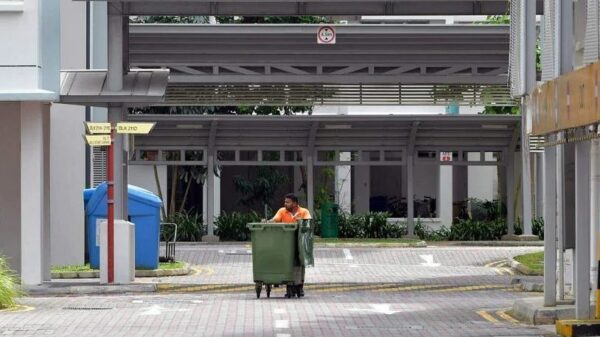
Service and conservancy charges (S&CC) are likely to go up soon for Housing Board residents, but the Government will provide temporary support to cushion the impact on households.
Town councils here are currently evaluating their finances to determine an appropriate increase in S&CC, and more details will be provided after these deliberations are completed, coordinating chairman for PAP town councils Lim Biow Chuan told The Straits Times.
S&CC was last raised in 2017, with the hike of between $1 and $17 per month phased over two years. Such fees go towards estate cleaning, landscaping, refuse collection, pest control and maintenance of mechanical and electrical fixtures such as lifts and lights.
When the rates are adjusted, “time-limited, special funding support” will be given to help residents deal with the higher fees, Minister for National Development Desmond Lee said in a written reply to a parliamentary question by Bukit Batok MP Murali Pillai on April 21.
Responding to queries from ST, Mr Lim said town councils have been facing increasing cost pressures over energy prices, maintenance costs and manpower costs. Some of these increases have been particularly sharp, such as for energy prices, which have risen by 23 per cent between 2018 and 2023, he said.
Lift maintenance costs have also increased due to higher labour costs for lift technicians and higher materials costs.
“With the implementation of the Progressive Wage Model to uplift low-wage workers, the town councils’ operational costs have also gone up due to increase in tender prices for conservancy cleaning contracts and horticulture contracts,” Mr Lim said.
Catch up on the news that everyone’s talking about
“This increase in costs cannot be avoided if we want to support the lower-wage workers.”
Mr Lim, who is also MP for Mountbatten, stressed that PAP town councils have been careful in managing expenditure and constantly seek productivity improvements and cost savings.
“Town councils are grateful to the Ministry of National Development (MND) for providing regular grants for our operations, which help us maintain S&CC at a lower level than we otherwise would need to,” he added. Some $240 million in grants are provided to town councils each year to offset maintenance costs so that they do not fully fall on residents.
Mr Murali said a key concern is that maintenance costs for mature HDB estates will rise faster than for newer estates.
Based on the latest financial statements, he told ST that town councils that manage a substantial number of mature flats tend to “run operational deficits before accounting for government grants, which are admittedly quite substantial”.
“In mature estates, there are simply more things to maintain,” he said. “For example, it is not uncommon to see perimeter drains that have become misaligned or damaged due to soil subsidence or natural deterioration.”
ST contacted nearly all 17 town councils, run by either the People’s Action Party or the Workers’ Party, but they declined to comment or did not respond.
Observers such as National University of Singapore (NUS) business school professor Lawrence Loh said the confluence of global factors such as inflation and geopolitical tensions having raised the cost of materials and services meant a price alignment is necessary.
But it is critical to ensure that lower-income households are not hit hard by the fee adjustments, he said.
“Financial support and rebates should remain a mainstay of assistance schemes. Yet, we have to consider carefully if any changes should be locked in permanently so as not to affect long-term financial sustainability,” said Prof Loh, who is director of the Centre for Governance and Sustainability at NUS.
“It may be prudent to introduce time-bound or one-off additional measures initially while the picture of overall economic recovery and cost stabilisation becomes clearer.”
Manpower costs are likely to be a strong driver behind the impending hike, said Singapore Management University’s associate professor of law Eugene Tan. He noted that wages have been rising after little to no wage adjustment during the pandemic years of 2020 to 2022.
Even so, there is always a question over whether S&CC hikes can be deferred or be smaller, given that town councils have operational surpluses, he said. “Furthermore, some residents are of the view that standards of estate maintenance have not improved, and so the hike in charges is less acceptable.”
Given additional funding from MND, some residents may also find the higher charges puzzling, Prof Tan added.
In its April parliamentary reply, MND said the Government had provided additional funding to town councils in May 2022 to help them manage steep cost increases caused by factors such as the pandemic, the Russia-Ukraine conflict and the global supply crunch.
The money would go towards projects under the Neighbourhood Renewal Programme and the Community Improvement Projects Committee (CIPC). CIPC funds are typically used for facilities such as covered walkways, footpaths, cycling tracks and playgrounds.
The Government gives out rebates in its annual Budget to offset the S&CC. Depending on flat type, Singaporean households will receive between 1½ and 3½ months of rebates in 2023.